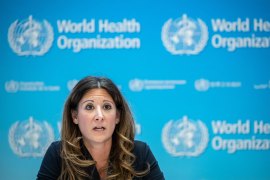Report Examines How Health Worker Shortages Could Keep Developing Countries From Achieving Universal Access To HIV/AIDS Prevention, Treatment
A shortage of healthcare workers in developing countries may hold developing countries back from achieving the U.N. Millennium Development Goal to achieve universal access to HIV/AIDS treatment by 2015, according to a report by the WHO/Global Health Workforce Alliance, IRIN/PlusNews writes.
The U.N. estimates that 36 percent of people living in low- and middle-income countries who are eligible for HIV treatment receive it, in part because of healthcare worker shortages, the news service writes. A 2006 report by the WHO estimated the global workforce shortage at 4.3 million (2/2). To meet the demand for health workers in Africa alone, an additional 1.5 million workers are needed, according to the Alliance. "Many countries with significant HIV/AIDS epidemics do not have enough health care workers to provide basic health services, let alone HIV/AIDS services," the report states (2011).
To examine the implications of health worker shortages on efforts to scale up universal access to HIV/AIDS, researchers conducted a literature reviews and analyzed "HIV programming over the past decade in Cote d'Ivoire, Ethiopia, Mozambique, Thailand and Zambia, only Thailand where the health worker shortage is less severe than in the other countries had achieved near universal access to HIV medication (78 percent)," according to IRIN/PlusNews (2/2).
"Based upon the gaps, challenges, and progress identified, the report suggests broad areas in which critical interventions are needed to scale up [human resources] for [universal access to HIV treatment, care, support and prevention services]," according to a WHO summary of the findings. "For each critical intervention, the report suggests specific actions that countries and the international community can take to implement it," according to the WHO (2011).
"To manage health worker shortages, countries are increasingly turning to volunteer community health workers including formally 'task-shifting', or reassigning them HIV care responsibilities typically handled by doctors," IRIN/PlusNews continues. The article describes several other recommendations in the report.
"There is no sure quick fix [to the lack of health workers], just steps that need sustained long-term investment," Mark Stirling, UNAIDS country director for China and former UNAIDS regional director for eastern and southern Africa, said, according to the news service. The article also includes quotes from a community health worker in Uganda, who spoke at the launch of the report on Jan. 31 (2/2).
This is part of the Morning Briefing, a summary of health policy coverage from major news organizations. Sign up for an email subscription.





